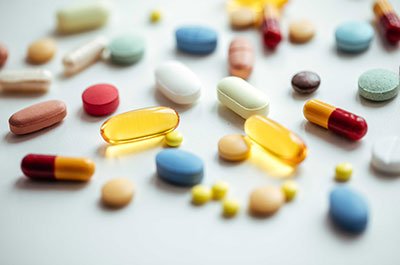From menopause and stronger bones to urinary tract infections, premenstrual pain, menstrual cramps and even hair growth, products and supplements marketed specifically to women are popular. According to some estimates, the worldwide market for women's health and beauty supplements is expected to reach nearly $80 billion by 2030.
Do these products work? Possibly.
Some companies produce high-quality supplements that can help women with various concerns. But these proprietary blends should be purchased with caution. Most have a laundry list of ingredients, and manufacturers are not required to list the amounts of everything in the product.
A better option: Ask your doctor to test your nutrient levels to uncover specific deficiencies. Then you can adjust your diet or consider recommended supplements that will address your unique needs.

Henry Ford Center For Integrative Medicine
Focus On Your Diet Before Adding Supplements
Before you start popping a daily supplement, look at what you’re eating. A diet full of fruits, vegetables, whole grains and lean protein can meet most women’s nutrient needs, particularly before menopause sets in. These foods contain thousands of disease-fighting compounds that work together to promote health and well-being. It’s impossible to package those powerful plant-based phytonutrients into a pill your body can easily absorb.
Most deficiencies result from eating a diet high in saturated fats, salt, sugar and ultra-processed foods. Vegetarians and vegans need to ensure they’re getting enough vitamin B12 since key sources are from animal products. And regardless of diet, vitamin D is typically a concern.
Supplementing Where It Matters
Women’s nutrient needs vary depending on life stage and medical history. Our ability to absorb nutrients does diminish with age. That’s when supplements come into play, but they’re meant to bolster the nutrients in whole foods, not substitute for them.
Work with your physician to ensure you’re getting sufficient amounts of critical nutrients—whether that’s through diet or with some supplementation—during specific life stages.
During the reproductive years
Nearly half of all pregnancies in the United States are not planned, so women of childbearing age should always get enough of specific vitamins and minerals required for a healthy pregnancy:
- Choline: Choline supports blood vessel growth in the brain and can help prevent birth defects. Unfortunately, many women don’t get enough choline during pregnancy, in part due to food aversions. Food sources include soy products, including tofu, soymilk and soy nuts, as well as cruciferous vegetables and ancient grains like quinoa.
- Folic acid: The body needs folic acid to make new cells, and it’s critical during pregnancy. Expectant women need at least 400 micrograms of folic acid daily to prevent neural tube defects in their babies. Food sources include spinach, leafy greens and fortified grain products, including breads and breakfast cereals.
- Iron: Your body needs iron to make the blood cells that carry oxygen to your body’s organs and tissues. You lose iron every month during menstruation. During pregnancy, your needs increase (27 mg daily). Food sources of iron include ancient grains, pumpkin seeds and fortified breads and cereals.
Once you’re pregnant, a good prenatal vitamin formula can ensure you cover all of the bases. But be sure to ask your doctor for recommendations.
During menopause
- Calcium: Bone loss accelerates during menopause, and if you don’t get enough calcium in your diet (1,200 mg after menopause), your body will take it from your bones. Getting calcium from food is best. Sources include dairy products, cruciferous vegetables, leafy greens, salmon and fortified orange juice.
- Vitamin B12: Our bodies aren’t as efficient at absorbing vitamin B12 as we age, so you may need to supplement as you get older. Common food sources include milk, poultry, sardines and herring.
- Vitamin D: It’s difficult to get enough vitamin D from food alone, and a deficiency in vitamin D is linked to fatigue, joint pain, mood disorders and even some cancers. Ask your doctor to test your levels of vitamin D. If needed, supplement with vitamin D3, the form that’s best absorbed by the body.
Women with certain health conditions
If you have certain health conditions, talk to your doctor about how to supplement your diet. Women who have polycystic ovarian syndrome (PCOS), osteoporosis and osteopenia, for example, can benefit from taking two key supplements: calcium and vitamin D. Both nutrients not only improve bone health, they also help regulate hormone levels.
Supplement Safety
According to the Council for Responsible Nutrition (CRN ), 75% of Americans regularly use supplements. For the most part, supplements are safe, particularly when they’ve been recommended by a healthcare provider. But some can create a nutrient imbalance. Others can interact negatively with prescription medications. And still others can create new health issues.
It’s also important to remember that supplements are not subject to the same rigorous Food and Drug Administration safety standards as prescription drugs, and many companies have inconsistent manufacturing practices.
When you’re shopping for supplements, look for the following assurances on the label:
- Good Manufacturing Practices (GMP) certification
- National Sanitation Foundation (NSF®) certification
- Pharmaceutical grade
Supplements can’t compensate for a poor lifestyle. Take steps to manage your stress, develop positive relationships, eat a healthy, whole-food diet and exercise regularly. Then, talk to your doctor about whether you need a supplement, and if so, which type and how much.
Dr. M. Elizabeth Swenor leads the functional and lifestyle medicine team at Henry Ford Health. She sees patients at Henry Ford Medical Center in Bloomfield Township. Learn more about Dr. Swenor and read her articles here.



